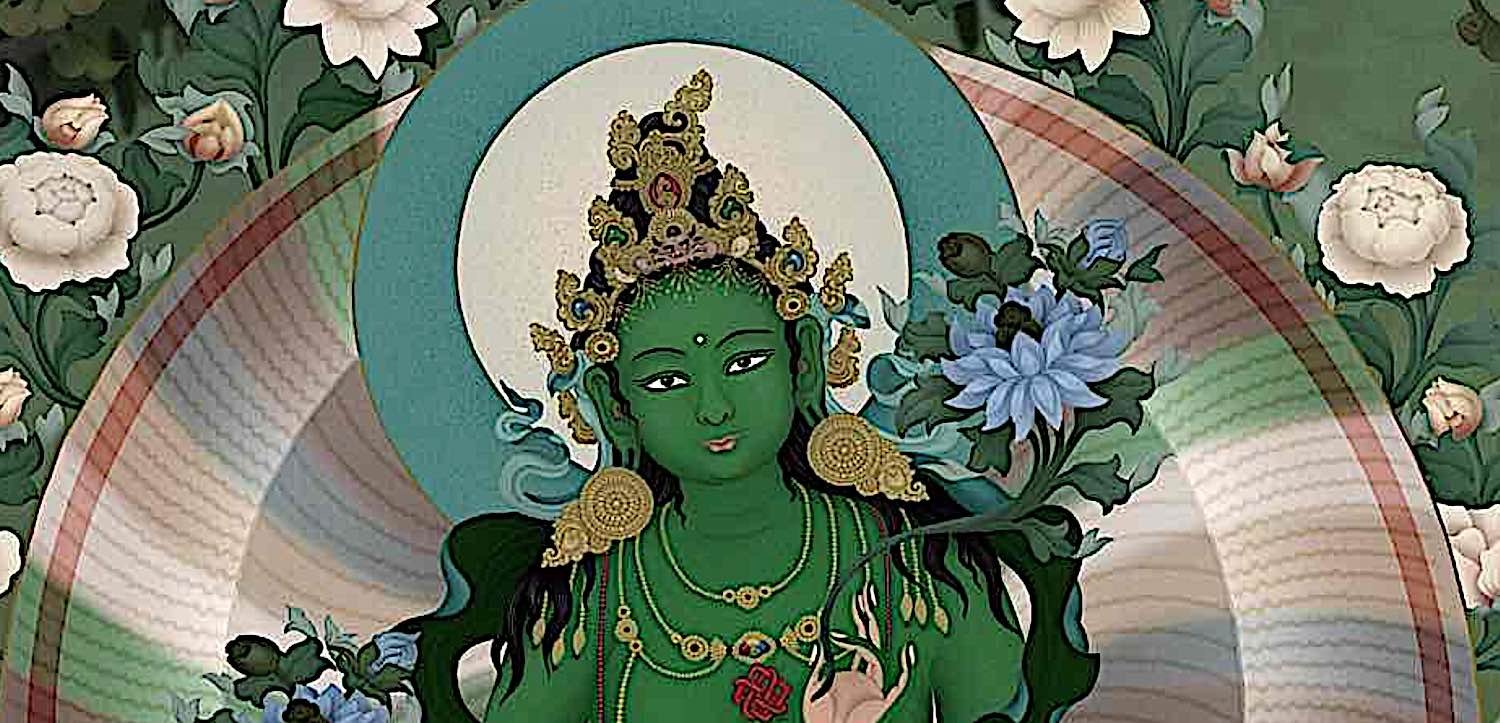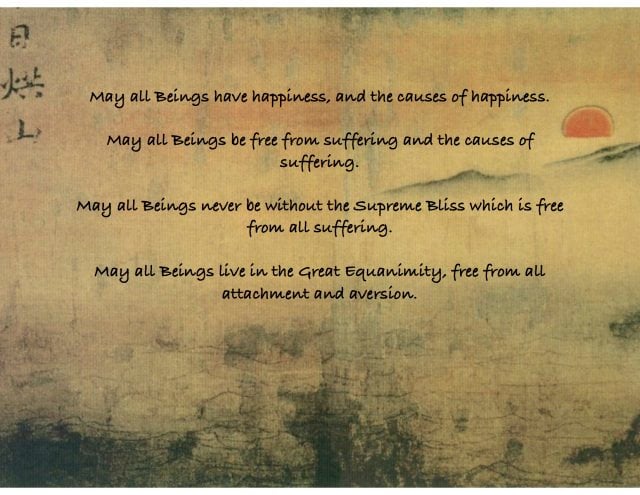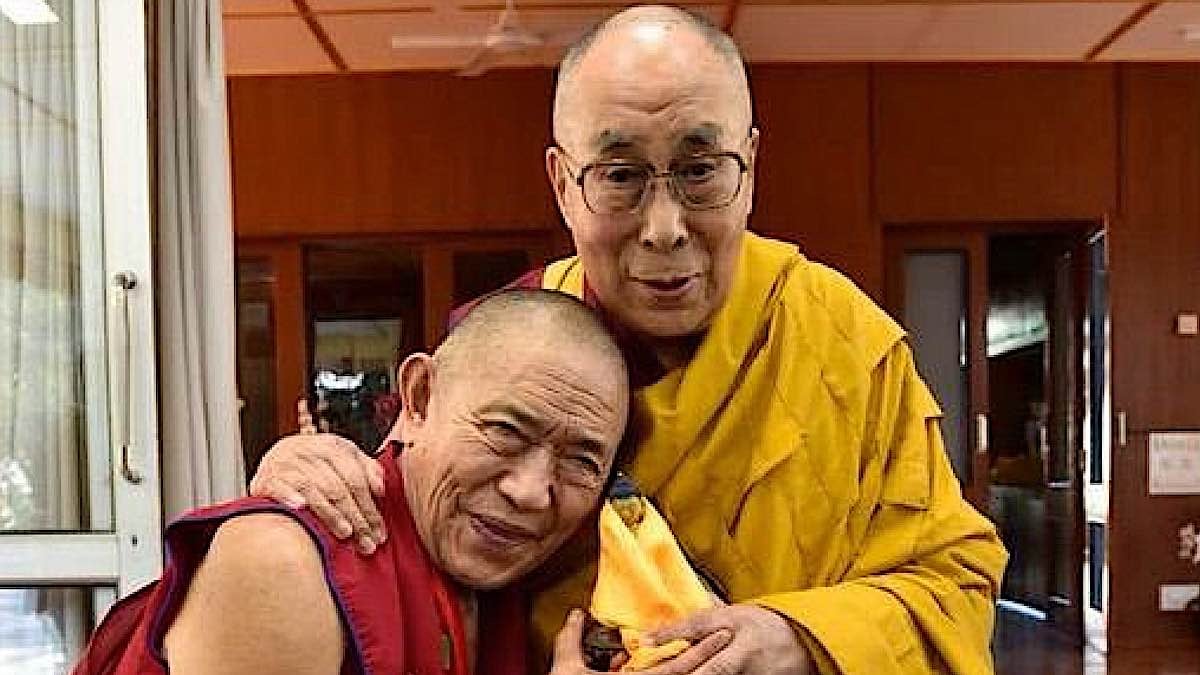Overcoming the Poison of Jealousy with Mudita, “Sympathetic Joy”! How can joyful Tara, and other methods, help us overcome the dangerous klesha of Envy?
Jealousy or Envy (irshya in Sanskrit) is among the most dangerous of the “poisons” of Buddhism. Why is Jealousy so dangerous? Why is overcoming jealousy a critical, urgent mission for Buddhists seeking realizations? It comes down to one core...

Jealousy or Envy (irshya in Sanskrit) is among the most dangerous of the “poisons” of Buddhism. Why is Jealousy so dangerous? Why is overcoming jealousy a critical, urgent mission for Buddhists seeking realizations? It comes down to one core concept. To have love and compassion and sympathetic joy for all beings — which is the Bodhisattva mission of Mahayana Buddhists — we have to first have to remove jealousy and envy.
What is the fuel of jealousy? It is self-loathing and a lack of sympathetic joy. The good news is that compassion and sympathetic joy can be learned (see the video with His Holiness the Dalai Lama below.) Removing the obstacle of jealousy and self-loathing is a key mission in all schools of Buddhism, all traditions and all lineages, from Theravadan through to Mahayana, Chan and Zen and Vajrayana. Nor, is this limited to Buddhism.
 Composite feature image from Buddha Weekly illustrating Tara’s green hands cradling the Earth. Tara represents the loving, compassionate activity of the Buddhas in our world.
Composite feature image from Buddha Weekly illustrating Tara’s green hands cradling the Earth. Tara represents the loving, compassionate activity of the Buddhas in our world.
This is done in various ways, depending on the tradition, but the method is to create a fertile ground for love and compassion to grow.
In Vajrayana, especially, this is the main mission of Buddha Tara, the Karma Mother. As the blissful mother of the Karma Buddha Family, joy and activity are her specialties. In fact, joy is also another way of describing “Tara.” She is the Mother of the Karma Buddha Family, who is tasked with overcoming Jealousy.
For a feature on Chittimani Tara, see>>
 Cittamani (Chittamani) Tara detail from Jampay Dorje’s painting of Green Tara.
Cittamani (Chittamani) Tara detail from Jampay Dorje’s painting of Green Tara.
In Mahayana Buddhism, there are Five Buddha Families, each tasked with helping us cultivate a specific type of wisdom to overcome one of the five great poisons. Mother Tara and Father Amoghasiddhi, the Buddhas of the North, teach us the Wisdom of Discernment, which is the remedy to the poison of jealousy.
For more on the Five Buddha Families, see A Map of the Mind Universe, the Five Buddhas>>How does Green Tara help us overcome Jealousy? Jealousy is often described as a “green-eyed monster.” Green is the color of Tara’s body — and she is known as the “swift one” because of her ability to quickly come to the aid of those who call on her.
Tara is able to dispel the darkness of jealousy with her light of joy. Removing our fears, we feel secure. When we are secure, happy and content, we are less likely to feel jealous. So, by invoking the energy and blessings of Green Tara, we can open our hearts to more happiness and contentment — and overcome the poisonous effects of Jealousy in our lives.

Mahayana Buddhism’s most important prayer
The most important and profound “prayer” in Mahayana Buddhism is the “Four Immeasurables.” Why? Because — like Mother Tara — it aspires to happiness and joy for all beings:
May all beings enjoy happiness and the root of happiness.
May they be free from suffering and the root of suffering.
May they not be separated from the great happiness devoid of suffering.
May they dwell in the great equanimity free from passion, aggression and prejudice.
When you have time enjoy and chant along with Refuge in the Three Jewels followed by the Four Immeasurables prayer as a visualized chant/meditation sung by the amazing Yoko Dharma:
This is the most important daily prayer — after Refuge in the Three Jewels — for good reason. It instills joy and the aspiration that others be happy. This is literally the “cure” for the terrible poison of envy or jealousy. And, it’s important to realize that “all beings” includes ourselves.
The Dalai Lama famously said: “If you cultivate loving kindness, compassion and concern for others, there will be no room for anger, hatred and jealousy.”
 His Holiness the Dalai Lama hugs Kyabje Garchen Rinpoche. Compassion and love for all sentient beings are the “main practice” of Mahayana Buddhists.
His Holiness the Dalai Lama hugs Kyabje Garchen Rinpoche. Compassion and love for all sentient beings are the “main practice” of Mahayana Buddhists.
All Buddhist teachings, regardless of tradition, place emphasis on loving-kindness and compassion. The Dalai Lama added to his comment above: “The jealousy that arises from another’s achievement is overcome by developing an awareness of and admiration for one’s own and other’s achievement.”
Joy and Bliss
In advanced Vajrayana practice — and certainly, in Green Tara practice — we come across the term “bliss” frequently. Bliss in this context is a big topic — we can’t dive into such a profound topic in this small feature.
However, it’s worth highlighting that two aspects of Vajrayana are conducive to the concept of joy, love, and compassion — which are the remedies for jealousy.
The first is visualization practice. This isn’t just “dress up” or “role-playing” — like going to Comicon in full costume. It is about visualizing our aspirations. In Metta meditation, for example, we visualize sending out our love to all beings in the form of white light (in the case of White Tara) or green light (in the case of Green Tara.) In advanced Tonglen practice, which is Bodhichitta visualized practice, we visualize sending out our healing strength to all beings, and in return taking back all of their pain and suffering.
Follow along here, as Venerable Zasep Rinpoche guides a Tonglen practice on Youtube:
These meditations are profound and real and effective. At an ultimate level, we are all connected. Even if you don’t accept the effectiveness of the practices, it is a powerful meditation.
The second is the concept of bliss and emptiness. Again, this is too big a topic — we’ve covered it previously and will cover it again — but suffice to say we cultivate a type of joy that only arises when we realize that we are all, at the ultimate level, Oneness. In this Oneness with all beings, we are sustained by bliss. That’s just one aspect of the practice — but sufficient to explain the gist.
In Vajrayana practice, and likewise in broader Mahayana practice, the remedy for Jealousy is JOY. By recognizing the good fortune of others, we increase our own good fortune.
When we are happy for the success of others, we are naturally more likely to achieve our own goals. This is the Law of Attraction in action. We attract what we focus on. When we focus on Jealousy, we attract more Jealousy into our lives. When we focus on Joy, we attract more Joy into our lives. This is the activity of Tara in our lives.
Tara’s joyful, compassionate activities are symbolized through her 21 Praises, which is a daily practice for most Tibetan Buddhists. Chant along with Hrishikesh Sonar in English with the short praise to 21 Taras:
Jealousy, the most difficult poison?
Jealousy and envy have inspired war, jealous rage, and murder, mayhem, strife among friends and family. The root cause of nearly every ill of modern society is envy. The other poisons — anger, attachment and craving, pride and aversion — to some extent are driven by envy. For this reason, it is one of the most important poisons to overcome. And, it is for this reason, that Noble Green Tara focuses her activities on removing the causes of jealousy: our fears, our insecurities, and our self-loathing.
Why do we tend to group envy with self-loathing? In Buddhism, the definition of ishya (Envy in English, issa in Pali) is “Being unable to bear the accomplishments or good fortune of others.” There is only one reason we can’t bear seeing others happy; because simply put, we aren’t happy ourselves. The simple recipe to attain happiness is to first wish happiness for others.
The good news, is that the compassion for all beings can be “learned.” When you have a few minutes, watch this excellent video from the Dalai Lama explaining how:
How to overcome Jealousy? All-Accomplishing Wisdom
In Mahayana Buddhism, each of the five poisons is associated with one of the five Buddha Famiies, who, in turn, represent a wisdom that can overcome that poison. Amoghasiddhi and Tara represent the Karma family and their wisdom is “All Accomplishing Wisdom.” The “Skanda” of the Karma family is “Formations” — or manifestation and karma (activity.) In other words, the antidote is virtuous activities, all-accomplishing wisdom activities. By engaging in the simple activity of joy, compassion and love, we neutralize the dangerous root poison of jealousy.
The method is simple: we have to develop JOY. JOY for ourselves, and JOY for others. JOY in our own good fortune, and JOY in the good fortune of others. JOY at our achievements, and JOY at the achievements of others. JOY that we are free from suffering, and JOY that others are free from suffering . . .
 Jealousy is a conditioned emotion that “starts when we are young.”
Jealousy is a conditioned emotion that “starts when we are young.”
This seems like a tall order, but it’s really not. It just requires some effort, some mindfulness and some practice. We can start small, with people we don’t know so well. When we see someone driving a new car, for example, instead of feeling envy or jealousy, we can feel JOY for them. “Good for them! I’m so happy they have a new car!” We can do the same thing when we see someone wearing new clothes, or going on vacation . . .
It’s important to remember that JOY is not the same as happiness. JOY is different from happiness in that it is not dependent on external circumstances. JOY is an inner state of being, a state of mind. It is something we cultivate. And, it is something that gets stronger with practice.
Pema Chodron explains Maitri:
Maitri and Mudita Meditation
The best way to develop JOY is through meditation. In particular, through cultivating positive emotions like Maitri (loving-kindness), and Mudita (sympathetic joy). There are many excellent books and articles on the subject of meditation, and we won’t go into detail here. But, suffice it to say that JOY is a state of mind that can be cultivated through practice.
Why is Joyful activity Tara’s main mission? Jealousy is a dangerous poison that can destroy our lives and our relationships. It causes war, theft, violence, hate, prejudice, aversion. It is also an obstacle to our spiritual development. Overcoming Jealousy requires effort, mindfulness and practice. But, it is well worth the effort, because the rewards are great. Not only will we be happier and more peaceful, but we will also be better able to help others. And, that is the most important thing of all.
Guided Tara meditation with Venerable Zasep Rinpoche:
Tara’s Mission: generating love and compassion
We tend to think of Tara as the “rescuer” or the superhero who swoops down to save us from all harm. Yes, she certainly has this noble mission, but she is motivated by Metta (love) and Karuna (compassion) above all. We first have to generate love, compassion and joy for ourselves before we can have — and help create it — it for others.
Tara is the embodiment of joy, helpful activity, self-love — all of the natural enemies of Jealousy. When we reflect on Green Tara’s qualities — her wisdom, compassion, fearlessness, boundless energy and blessings — we are reminded of our own potential. We are also reminded that Jealousy is not an insurmountable enemy, but rather something that we can overcome with study, practice and perseverance. With Joyful Tara as our guide, we know that we can develop the antidotes to Jealousy’s poison and create realizations in our lives.
Green Tara mantra chanting is a helpful daily practice to help over come fears and insecurities:
Tara embodies the “cure” for jealousy
How does Tara actually address jealousy? In a feature on Jealousy and Buddhism, Beth S. Patterson, MA, LPC writes:
“Jealousy flows from believing that we are not good enough just as we are. For example, I have noticed that my jealousy rears up when I feel judged or insecure.”
What does Tara help us with? Why does she protect us from every fear and insecurity. Simply put, She knows that it is insecurity that allows jealousy to rear up its ugly head. By removing all our worries, insecurities and fears, we can remove the underlying cause of jealousy.
In her book, Jealousy: A Spiritual Perspective, psychotherapist and author Anne Stirling Hastings writes:
“Jealousy is based on a deep-seated insecurity that we are not worthy of love. Jealousy is a form of self-hatred.”
Tara helps us to see our own worthiness and beauty — so that we can love ourselves, and know that we are loved. When we have this self-love, jealousy cannot find a foothold in our hearts. So, invoking Tara’s energy can help us to fill our hearts with self-love — and overcome the jealousy that arises from insecurity and self-hatred.

Mudita — “Sympathetic Joy”
Grief Counseler Beth S. Patterson, MA, LPC explains Mudita:
“The Sanskrit term for sympathetic joy is mudita. Buddhist teacher Sharon Salzberg defines mudita as “the pleasure that comes from delighting in other people’s well-being.”The cultivation of sympathetic joy is indeed a pleasure – It frees us from the suffering of our painful emotions. In addition, rejoicing in others’ happiness actually creates happiness and satisfaction in ourselves. In the words of the Buddhist master Dzigar Kongtrul Rinpoche, “When you rejoice, you really feel like you have a richness inside. Your good heart sustains your mind.”
“Appreciative joy” is another translation of mudita: Appreciation is taking the time to notice what’s already here, what we have right now in this very moment. This capacity gives us the inner strength to work with our suffering in a skillful way, and to stay connected to each other as we do.”
A prayer to Green Tara Focused on Jealousy
Om Tare Tuttare Ture Soha
Homage to the Swift One, Tara!
You who are known as the liberator,
The one who saves us from all fears.
Please come to my aid,
And dispel the darkness of jealousy with your light of joy.
Fill my heart with self-love and contentment,
So that I may overcome all poisonous thoughts and emotions.

 MikeTyes
MikeTyes 






























![If AI Can’t Read Your CMS, It Can’t Recommend Your Brand [Webinar] via @sejournal, @lorenbaker](https://cdn.searchenginejournal.com/wp-content/uploads/2026/03/2-237.png)